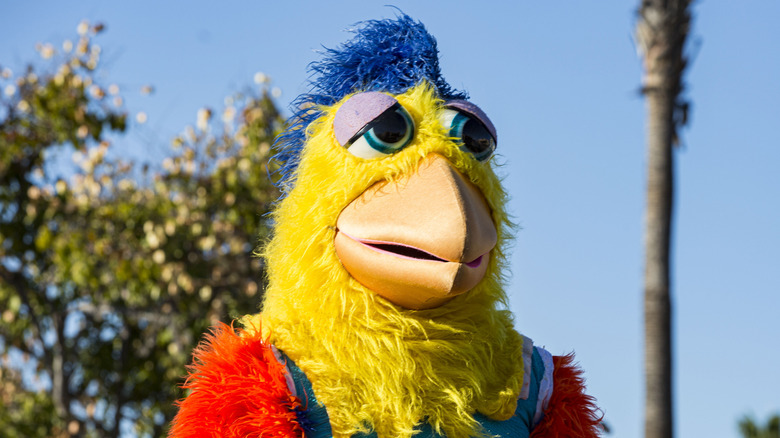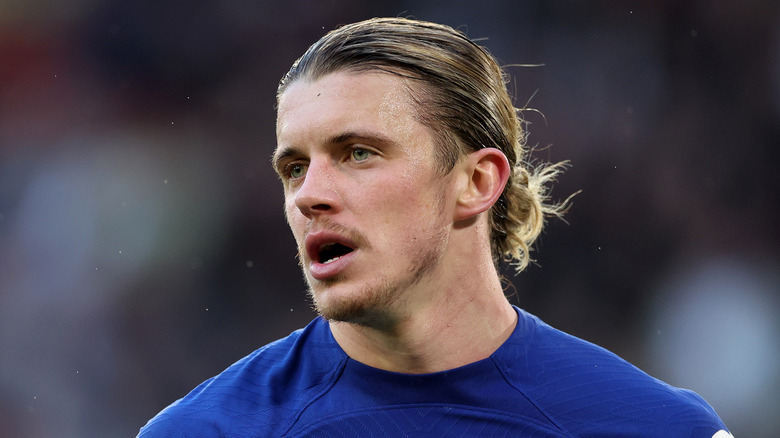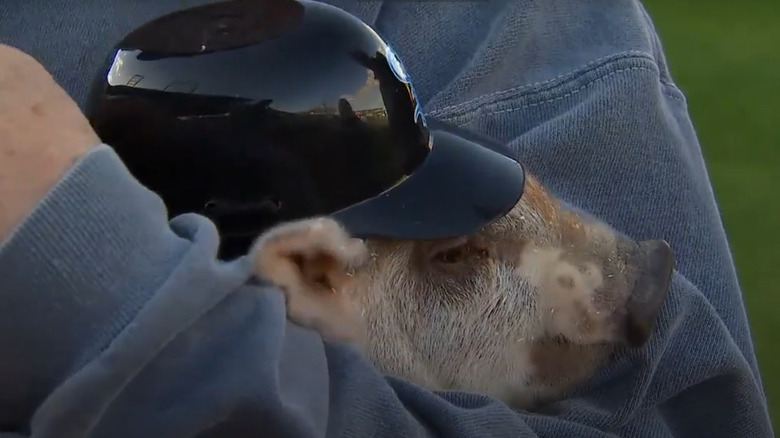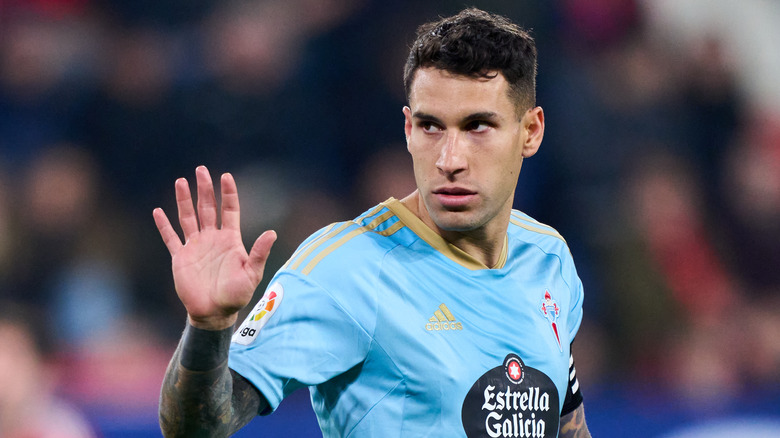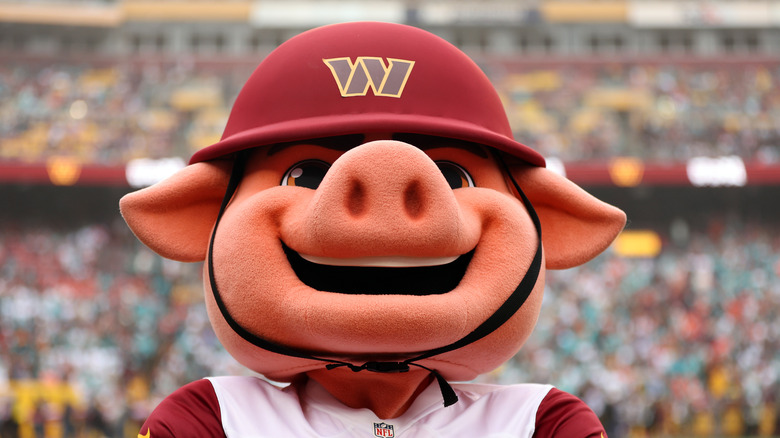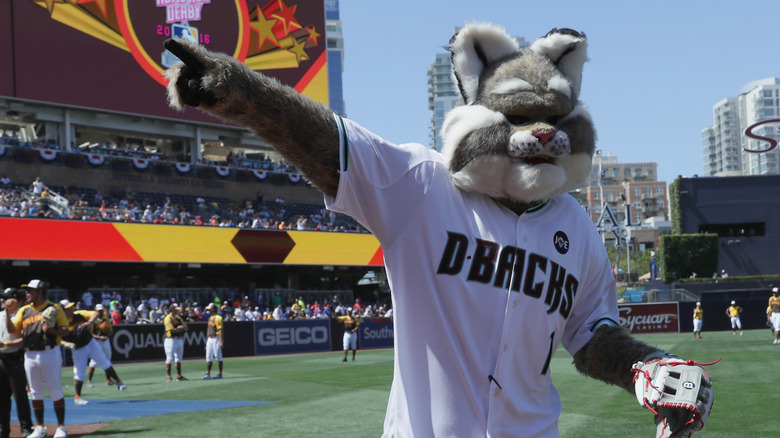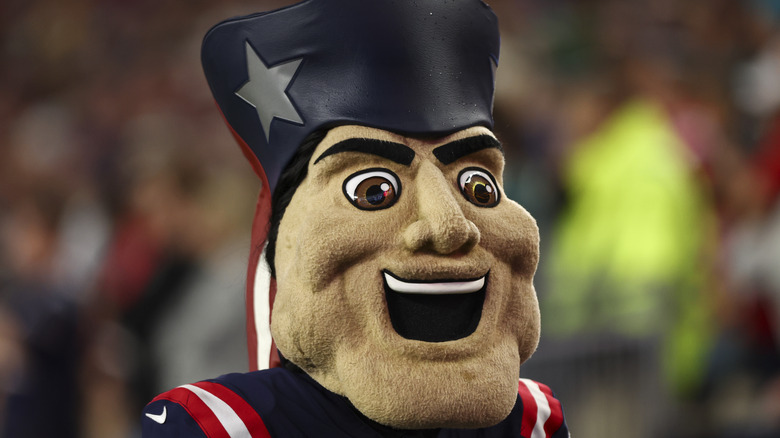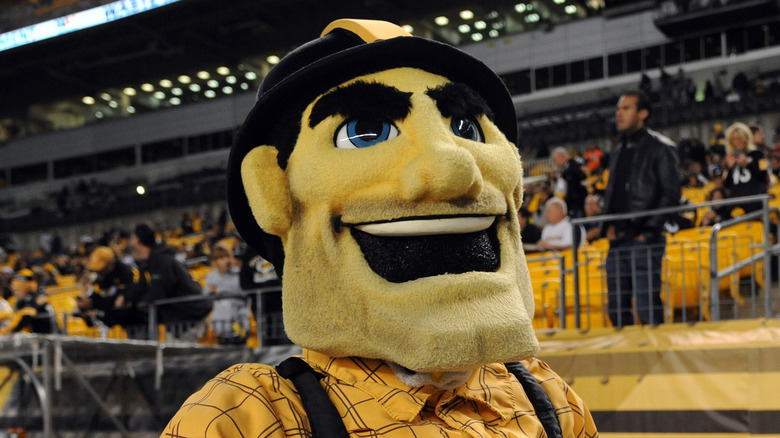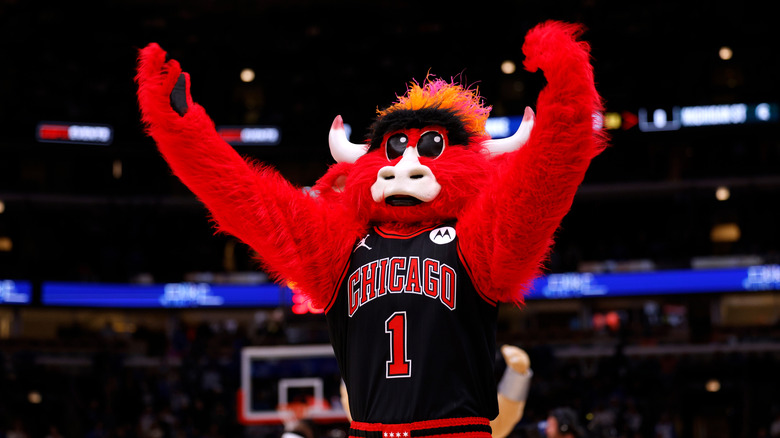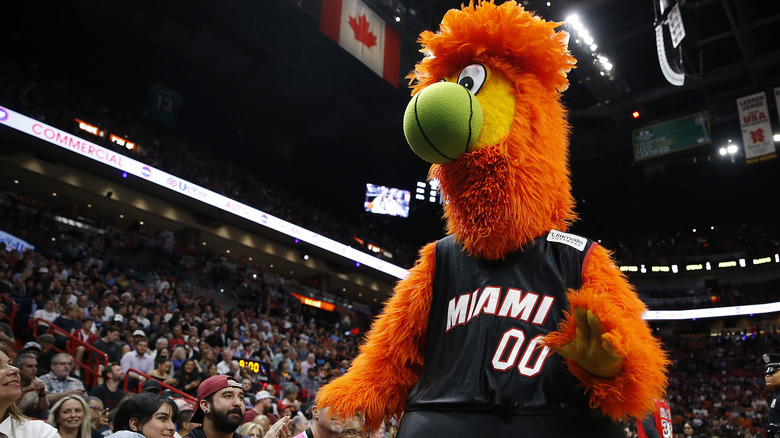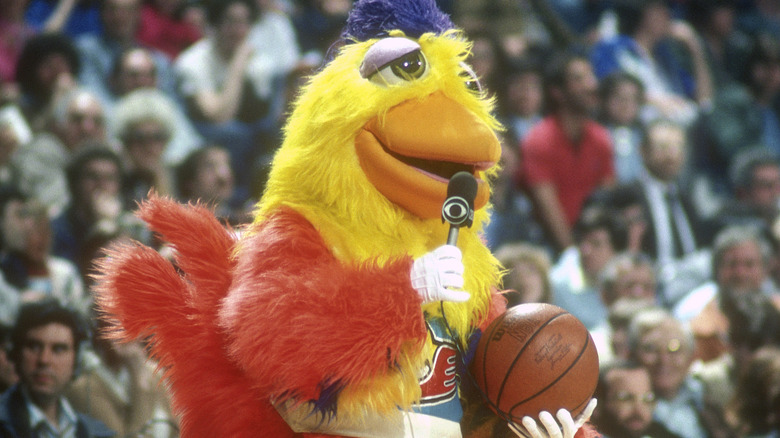Sports Teams Mascots That Were Involved In Scandal
Sometimes, being a mascot is a dirty job, but somebody's gotta do it. Before he became famous, Brad Pitt had to undertake such a task promoting a restaurant in a chicken suit. Ditto for Megan Fox, whose function at a smoothie outlet included slipping into a banana outfit. And hardcore reality TV fans will never forget the FOX series "The Simple Life," which at one point saw Paris Hilton and gal-pal Nicole Ritchie stuff themselves into giant beverage ensembles while working at a Sonic burger drive-in.
Celebrities and civilians who donned themselves in mascot apparel might have found the experience to be cumbersome and even humiliating, but it's a different matter for folks doing the same job in the sporting world. If teams are struggling, mascots might be the only entertaining draws in the arena. But done properly, mascots can be a branding bonanza for franchises seeking more animated and personified identities. It also helps if they're designed with next-gen fans in mind and are particularly engaging to youngsters. "A six-year-old would rather see a mascot than a player," said industry consultant Andy Applebee to Forbes. But while slapstick routines and cheerleading contortions might be fun for all ages, some of the folks underneath all that get-up have found themselves in particularly inauspicious adult situations. A worst-case scenario might spell a public relations disaster for the team regardless of how well it's playing. Here's a look at a few instances where mascots could have done without the attention.
A soccer snub sparked outrage online
Brit soccer franchise Chelsea FC sports feline characters Stamford the Lion and Bridget the Lioness, but it's the child's mascot programme that the team is especially proud of. The initiative doesn't force the kids to change into any arcane costumes. Instead, the lucky children dress up in the team's uniforms and march onfield with the squad in an envious opportunity to get up close with their favorite players. Which makes it all the more heartbreaking to the kids involved in an incident late in March that created a ruckus on social media. While waiting to hit the pitch for a game against Burnley, midfielder Conor Gallagher was caught on video shaking the hand of one child mascot, before patting the neck of another youngster, ignoring his gesture for a palm grip.
The backlash was fast and furious with Gallagher's Instagram account jammed with angry comments about the player's behavior (via Mirror). One response from former player Paul Canoville, the first black athlete to play with Chelsea, was particularly scathing, accusing Gallagher of racism, pointing out that the ignored child was also black. All of which forced the club to issue a livid statement of its own. "The subsequent level of abuse and defamatory comments directed towards Conor Gallagher is completely unacceptable," read the statement, per Football London. "We are proud to be a diverse, inclusive club where people from all cultures, communities and identities feel welcome."
Gallagher never commented on the issue, although Canoville eventually tweeted a public apology.
Baseball fans thought a piglet's name was insensitive
You've got to hand it to the St. Paul Saints, a Minnesota-based minor league baseball team for keeping it real, by using genuine piglets to signify the city's origins as Pig's Eye Landing. The team's also been quite clever at naming their mascots, with monikers that ran the gamut from Ham Solo to The Notorious P.I.G. In 2022, the Saints dubbed their porcine representative Space Ham as a tribute to Bill Murray, who was a minority owner of the franchise at the time and who had a role in the 1996 movie "Space Jam."
But in March, the creative department wanted to make things edgier by calling their latest mascot, OzemPig, which had fans clamoring for the name to be butchered. Equally controversial was the backstory they scripted, citing the pig's desire to be slim. The source of the dissenting squeals? Many felt the choice of OzemPig was far too close to Ozempic, a weight-loss medication, deeming the campaign to be an insensitive body-shaming exercise. "In today's world, people don't want to be diminished, they don't want to be made to feel a certain way and I'm not going to tell them how they feel is wrong," said Saints' vice president Sean Aronson, per NBC News. "But I can tell you there was no ill-intent, there was no maliciousness, there was never even a discussion in the room when we were going over the name that hey, this may offend some people."
Soccer star charged with sexually assaulting a mascot
In July, Spanish soccer star Hugo Mallo will make a public appearance he wishes would go away. Instead of a massive stadium, where the player has proven his mettle as a defender currently with Brazil's Internacional club, he'll be facing a judge answering to sexual assault charges he allegedly committed 5 years earlier as a member of Spain's Celta Vigo squad. According to prosecutors, the incident took place at a match against Espanyol, when during the customary pre-game lineup, Mallo approached a woman dressed in the opposition's trademark parakeet costume and fondled her breasts. Mallo's defense team has pointed out that an aerial shot of the incident, provided by sports publication As, was far too distorted to reveal what actually happened. However, in January, Spanish Provincial Court determined that the imagery was enough to proceed to trial, slated for July 11.
Not surprisingly, Mallo's Brazilian franchise was quick to offer support for its beleaguered player. "First of all, we categorically deny the reported facts," said the team in a prepared statement, per Football Espana. "Which is what was already stated before the Court that investigated them, demanding absolute respect for the presumption of innocence." On his Instagram account, Mallo pleaded for respect, pointing out that this case was previously dismissed although it was overturned on appeal. He added that neither his old Spanish team or Espanyol uncovered anything to counter his innocence. The player faces a hefty fine if he's found guilty.
A hog became the center of a lawsuit
At first glance, the whole idea of a pig representing a sports franchise runs counter to the nature of athleticism. But try telling that to Washington's NFL team that was once populated by The HOGS, a formidable barricade on the front lines that halted opposition defenses well enough to win three Super Bowl titles during the '80s and early '90s. Back then, Washington didn't have a pig mascot, since their moniker at the time was an indigenous slur that was scrapped in 2021. But once the team became the Commanders, however, the time was ripe to trot out a mascot to truly commemorate the Hog legacy. Enter Major Tuddy, a helmeted porker introduced in December, 2022, tapped to debut the following January during Washington's final game of the regular season.
Totally unimpressed with the mascot and the team's itinerary was O-Line Entertainment, formed by NFL veterans previously part of the HOGS, who sued the team. "The Commanders are using the original HOGS brand for commercial purposes with NO compensation to the men whose blood & sweat equity built the original HOGS brand 40 years ago," read the suit, per CBS Sports. "We are planning a celebration of the greatest offensive line ever to play the game," responded the Commanders in a release per Washington Times. "The HOGS are a key part of our franchise's history and we want to keep their legacy alive with the next generation of fans."
A DUI ended an Arizona mascot's career
Credit Major League Baseball's Arizona Diamondbacks ingenuity for choosing a predatory feline for a mascot in 2000 instead of a snake. But it was David Hamilton, the occupier of the team's Baxter the Bobcat costume, who found himself slithering to the unemployment line in January 2009. According to a since-deleted Arizona Republic story reproduced in a blog dubbed Sons of Steve Garvey, police pulled Hamilton's Toyota Scion off the street in Phoenix when they noticed the vehicle, emblazoned with a Diamondbacks logo, was speeding at a rate close to 100 mph. A toxicology exam on the spot revealed Hamilton had a blood alcohol reading of 0.155, nearly twice the legal limit of 0.08. Hamilton, who had his Baxter the Bobcat costume in the back of the car, also admitted he had smoked a bit of weed before driving.
While the Diamondbacks brass was likely unimpressed over the arrest, what also set them off was that Hamilton had kept that incident from the team for months before he was fired. "After concluding our own investigation and gathering the facts involved, we felt it was necessary to take corrective action," said Diamondbacks President and CEO Derrick Hall, per Sports Rubbish. "We will pursue a replacement for the mascot that is such a large part of our fan experience immediately." The incident was a brief black eye to the organization and a disappoint to fans, who were responsible for choosing a bobcat as its mascot.
A Pats mascot was caught in a prostitution ring
In 2009, when superstar quarterback Tom Brady was in lock and load mode to get an armful of Super Bowl titles, New England's winning reputation was briefly eclipsed by the giant head of Pat Patriot. More specifically, it was Robert Sormanti, who wore the massive melon that represented the mascot, and allegedly went all the way, while on the wrong side of the law, when he was arrested by State Police for his involvement in a prostitution ring. He was among 14 people busted by an undercover operation in December at a hotel in Providence, Rhode Island for taking part in an indoor sex trade. Apparently, whatever Sormanti was engaging in was legal until a month before the arrest due to a loophole in the criminal code, which the state government rectified by introducing a law turning indoor prostitution into a misdemeanor charge.
The Patriots were quick to terminate Sormanti's involvement with the NFL franchise. "The Pat Patriot mascot costume is worn by multiple people, each of whom are held responsible and accountable for their actions," said team spokesperson Stacey James, per Boston Herald. "The individual in question has been suspended. The mascot responsibilities will continue to be fulfilled by others." Despite the seriousness of the incident, some folks had a little fun with the story, especially The Bleacher Report, which spun a slew of yarns that included the need to pursue Federal Stimulus funding to dry-clean the Patriot costume.
Pittsburgh's Steely was nailed in a DUI
One thing that's undisputed about the predominantly blue-collar metropolis of Pittsburgh is that its football fans not only work hard, but play hard as well, as indicated by the NFL Steelers' burley, hard-hatted mascot known as Steely McBeam. But one of the folks who portrayed McBeam hardly had an iron-clad alibi for drunk driving. In 2008, Kenneth C. Hahey, was arrested by police who initially caught him committing a traffic sign violation only to discover he was inebriated while behind the wheel. It was reported that Hahey failed a toxicology test numerous times, with further tests in jail revealing he blew a 0.173 bood-alcohol level, more than twice what's allowed for drivers.
The Steelers revealed they already had a replacement to wear the McBeam costume when they announced Hahey's departure from the team. Ironically, when the mascot was chosen to represent the franchise two years earlier, administrators chose the name based on the city's ore industry, the Irish heritage of the Rooney family who own the team, and the steel beams produced in Pittsburgh– although it was no secret that owner Art Rooney particularly liked the occasional nip of Jim Beam. The Steelers denied the incident required a reassessment of a different mascot to replace McBeam. "We haven't had any discussion at all about changing that," said spokesperson David Lockett, per The Trib. "He's still going to be out there in the community uninterrupted."
The Bulls mascot got busted for punching a cop
Chicago, which gave the world Twinkies and deep dish pizza, also has a reputation for being a rough city, in part due to its heritage as a one-time haven for organized crime. The same seems to go for mascots, especially Benny the Bull, the bovine figurehead for the Windy City's NBA franchise. That reputation was most succinctly exemplified by Barry Anderson, who's portrayed Benny for years. But he didn't achieve infamy for the way he cheered on the Bulls at court side. Rather, it was how he acted away from the hardwoods that landed him into a heap of trouble.
In 2006, Anderson was attending the Taste of Chicago festival astride a miniature motorcycle and in full mascot attire when an off-duty cop working security at the event wanted to reprimand him for driving on a parkway without a permit. After Anderson tried to run, the officer caught him, prompting the mascot to punch him out, knocking off his glasses and breaking his watch in the process. Although Anderson was arrested and booked for the permit infraction and assault, police later dropped the charges. The Mayor's Office of Special Events made it clear that the team wasn't to blame for the incident. "We always love working with the Chicago Bulls and we know that what happened was not their fault," said spokesperson Veronica Resa, per ESPN. Anderson managed to keep his Bulls gig, retiring in 2017.
Miami's Burnie injured a federal judge's wife
On the topic of hoops, Miami Heat fans love to feel the burn, more specifically from their mascot Burnie, who doesn't resemble any known species on this planet. But the folks who have worn the fuzzy outfit comprising Burnie have proven themselves to be quite human, and as such, have been prone to make mistakes. Probably the most famous incident that landed Burnie into that proverbial ring of fire took place in 1994 in Puerto Rico, where the Heat played an exhibition game. During the match, Burnie, or more specifically Wes Lockard, the man underneath all that fake fur, dragged an unwilling woman named Yvonne Gil-Rebollo onto the court, where she claimed her purse got wrecked, while she sustained an arm bruise and public humiliation. Gil-Rebollo, whose spouse is a federal court judge, sued the team for $1 million, but received only $10,000 in compensation after a jury ruling two years later. "This was no case for that jury," angrily stated Ana Bonar, Gil-Rebollo's mother, per Tampa Bay Times. "They clearly did not understand the case."
Dodging an expensive bullet, that didn't stop Burnie from getting into further trouble, including accidentally injuring a teacher while making a public appearance at an elementary school in 2015. Details of the settlement were confidential. Two years later, during a home game, an arena security guard suffered a leg injury after colliding with Burnie and sued the team. The outcome was never made public.
A cheerleader sued the San Diego Chicken
The mascot legacy doesn't get any bigger or more notorious than the outrageous San Diego Chicken, a fixture at MLB San Diego Padres games and an assortment of basketball matches throughout the NBA. For 50 years, Ted Giannoulas has donned the famed bird suit and engaged in theatrics that would delight hometown fans and rile opposition teams. His antics have even gone so far as to upset officials of the Soviet Union in 1978 when a Russian hockey team played a match with the old World Hockey Association's San Diego Mariners. Evidently, they were upset over the mascot's KGB shirt, until it was explained to them the letters represented the call signs of a campus radio station the Chicken represented instead of the country's secret police.
But one of the most serious charges lobbed at Giannoulas took place in 1991, when a Chicago Bulls cheerleader sued the San Diego Chicken for a $1 million, claiming she had suffered a broken jaw after an altercation with the mascot. Kimberly Smith claimed that the Chicken tackled her on the court during a routine she was performing with the Chicago Luvabulls, sustaining enough injuries to force her to quit cheerleading. In the end, a jury awarded her $300,000. "One of the tragic things, not only does she miss the rest of the season, but the Bulls went on to win the championship," said Smith's lawyer, Victor Ciardelli, per Seattle Times. "She was very upset."

